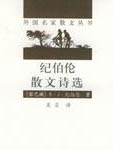Chapter 1 Introduction to "Treasures"
"Treasures" is a comprehensive collection with rich content and diverse genres. It includes 36 works, including 16 prose poems, 14 rhyme poems, 5 literary essays and reviews, and one play.us.The selected prose poems only account for half of this collection, and it cannot be said to reflect the whole picture of "Zhenqupian", which is different from other selected collections.
The publication of "Treasures" is also very special. It is not edited and published by the author in direct contact with the publisher, but by an Arab publisher named Yusuf Toma Bustani in Egypt, Arabia. Edited and published by People Bookstore.Because it is selected from Gibran's works scattered in various places, it is different from some of Gibran's collections in content and style.
same.This collection was published in 1923, but many chapters were written many years ago.
As far as prose poetry is concerned, the most important chapter in this collection is "You Have Your Lebanon, I Have Mine" published in Cairo's "New Moon" magazine in 1920.This is a wonderful article with profound conception, magnificent momentum, novel form and brilliant literary talent.The entire text uses roughly similar sentence patterns, and the order corresponds to repetition, and it is completed in one go, vividly showing Gibran's patriotic passion and beautiful social and political ideals.
"You have your Lebanon and its problems, I have mine and its beauty."
"Your Lebanon is an old man who strokes his beard, frowns and frowns, and only cares about himself. My Lebanon is a young man who stands tall like a tower, smiles like morning, and thinks of others like himself."
Gibran used the method of narration and comparison to describe two very different Lebanons. The Lebanon of his opponent was inextricably linked. "Political parties" are endless "lies" and "debates", and they are dying; Lebanon in Gibran's mind is a magnificent nature, "distant thoughts", "hot feelings", " The sacred language" is "the ambition of youth, the determination of middle age, and the wisdom of old age", "the simple and bare truth", and the vigorous youth.
In Gibran's view, the sons and daughters of Lebanon should be able to represent Lebanon's "will in the rock, nobility in the majesty, sweetness in the flowing water, and fragrance in the air", and they should make their lives "a drop of blood in the veins of Lebanon".
These sons and daughters include "farmers", "shepherds", "gardeners", "weavers", "potters", "masons" and other workers from all walks of life, as well as "poets who pour their souls into new cups".They are "lamps that cannot be extinguished by the wind, and salt that cannot be eroded by time", and they are people who are walking towards truth, goodness and beauty with firm steps.
This prose poem has incomparable vitality, it still has practical significance, and it will show the charm of cross-century.
There are many other chapters in "Treasures", all of which are highly realistic. "Independence and the Red Felt Hat", in order to emphasize his "independence" and "dignity", a compatriot refuses to take off his red felt hat in the restaurant of a French passenger ship, which triggers a deep perspective and analysis of national psychology .Gibran said, "A people enslaved in spirit and mind cannot be made free by their clothes and customs", and the misfortune of their fellow-citizens is that they "resist the effect without noticing the cause. Before winning the essence, the first Governed by chance".He appealed to his compatriots not to blindly fight for "independence" in trivial matters, but to fight for "technical independence" and "industrial independence", which he said were issues "hanging over everyone's head".
The article "New Era" pointed out, "Today, in the East, there are two kinds of thinking that are struggling with each other: old thinking and new thinking". "Today, in the East, there are two kinds of people: the people of yesterday and the people of tomorrow".The author asked sharply: Orientals, which category do you belong to?First or second, "If you're number one, you're one of the extinct cave-dwelling, fur-wearing tribes; if you're number two, you're one and Dawn Towards the national vanguard of the day of justice and wisdom".He called on compatriots to respond to the "call of life", to be "sons and daughters of tomorrow", and to be "free people belonging to tomorrow".
In the article "The Shell and the Core", Gibran raised his above views to the height of philosophy.He pointed out that life does not lie in its "appearance" but in its "connotation", a thing does not lie in its "shell" but in its "core", a person does not lie in his "face" but in His "inside".For religion, art, society, and individuals, we should also first see their internal essence.These insights may not seem particularly surprising today, but in the era when religionists, politicians, and "scholars" all sang beautiful songs, where it was difficult to distinguish the chaff from the essence, this "skin" Isn't the philosophy of shell and core very timely and valuable?
Readers have entered a vast and profound spiritual world in articles such as "My Heart Admonishes Me", "My Heart Is Heavy with Fruits", "Perfect", "A Wider Ocean".Here the author is sometimes a philosopher, talking about phenomena and essence; sometimes a moralist, expressing the troubles of the selfless giver; The road of spiritual communication... He and his soul are companions, patrolling the world, hoping to find a sea cleansed of dirt.They found it, but were not satisfied, so they went looking for "a wider ocean".
When we traveled around Gibran's spiritual world, we found that it not only aroused reverie, but also cultivated the soul. "Treasures" is indeed a veritable "Anecdote and Interesting Talk"!
—— Yihong "The Complete Works of Gibran's Prose Poems Preface"

